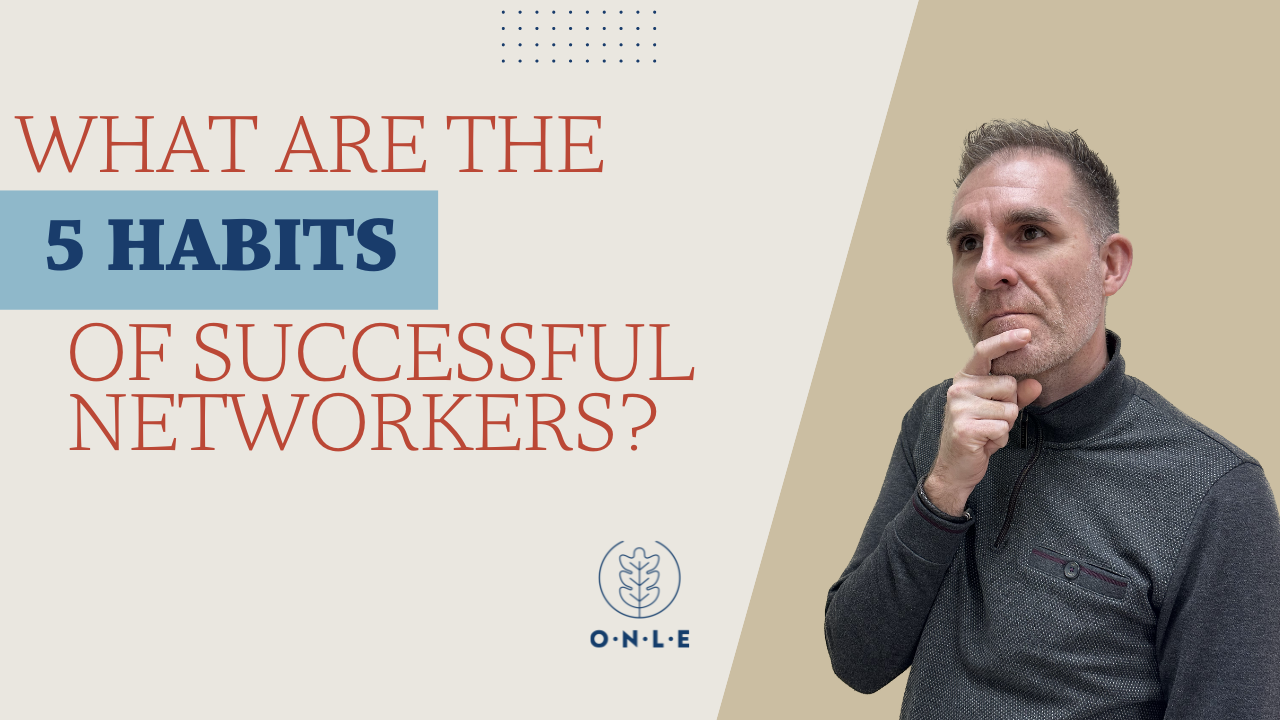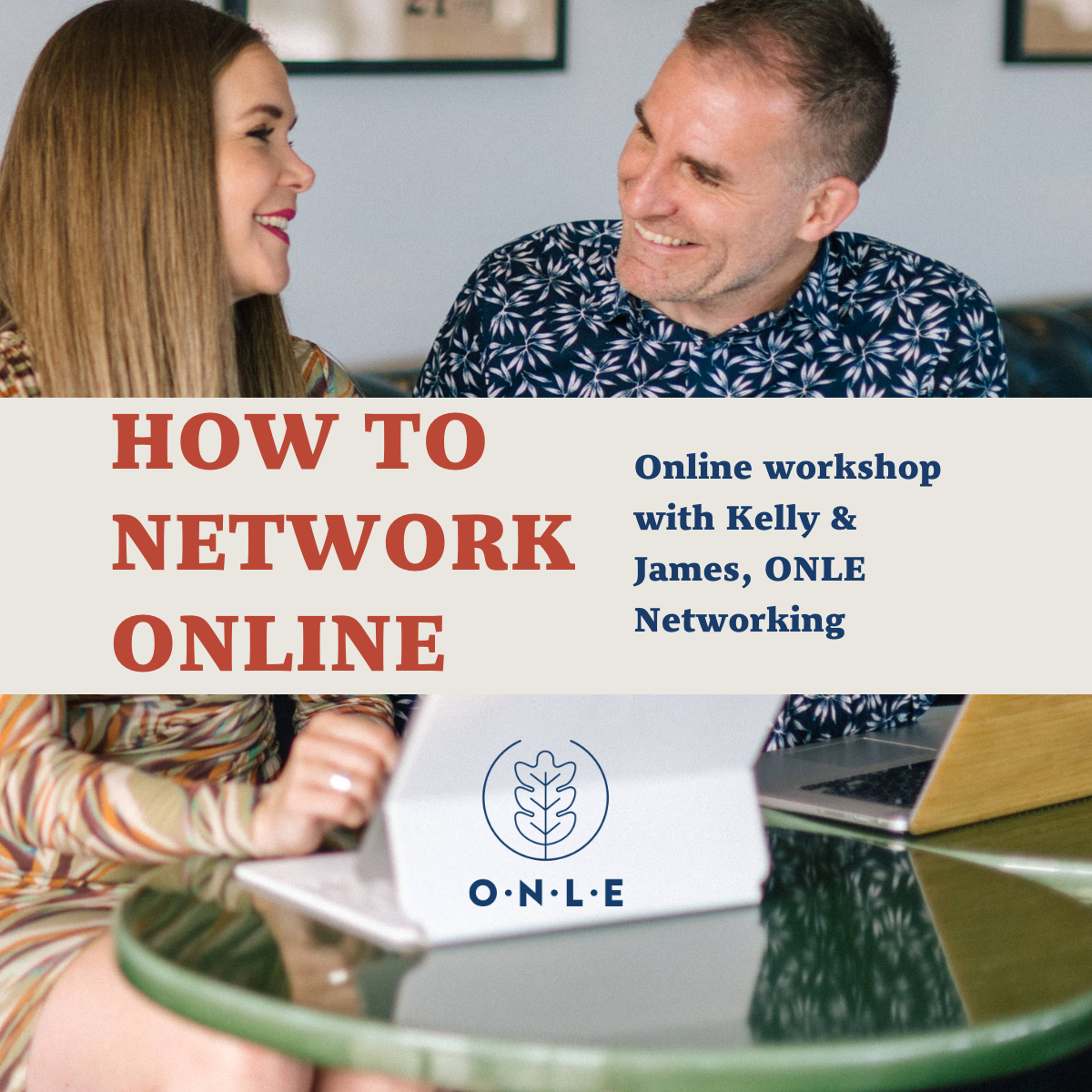5 habits of successful networkers
To outsiders, it seems that successful networkers make connections and sales with little effort. But in reality, their success is driven by some very simple habits which they repeat during - and after - networking events. James West, co-founder of ONLE Networking, explains.
Successful networkers:
1) Help before asking for help
Networking is about building mutually beneficial relationships. Think about that expression: mutually beneficial relationships. It’s natural to attend networking events with the intention of trying to get something for yourself. And that’s fine - don’t beat yourself up for trying to gain from networking - we all need that. The problem is that if you lead with what you can get, you invariably act like a taker.
Remember, although we all attend networking to gain something, no one owes you anything! We are put off by pushy, selfish people and are less likely to want to help them. We ARE inclined to help people who show interest and try to help us. That’s human nature. So don’t expect help if you’re not willing to help others.
So think about your own networking behaviour. Who are you helping and how? It’s a misconception that the only way to help while networking is to hand someone a strong business referral or spend money with them. While both of these activities will always be welcome, there are other ways to help people without spending money.
“We ARE inclined to help people who show interest and try to help us. That’s human nature. So don’t expect help if you’re not willing to help others.”
The easiest thing to do is show interest in people! Even if you can’t help them now, they will appreciate you giving them time. Continue that by supporting their blog/content, perhaps by sharing on social. Message them a show of support when you see they’ve achieved something. Connect them with someone you’ll know they’ll love speaking to. If you do these things, you stand out from a sea of takers. We all want to stand out at networking. Successful networkers do this by helping others.
2) Enjoy meeting people
Similar to entering a networking event with a purely selfish attitude, if it’s clear that you’re not really open to speaking to people or interested in what anyone else has to say, building relationships and support for what you do is almost impossible.
Reframe networking by considering a statement that underpins my networking: people are endlessly fascinating! So use the ice-breaker opportunity to find out more about the lives and businesses of the people you meet. I don’t condone asking questions about someone’s private life as soon as you meet them. But in my experience of thousands of networking conversations, whenever I’ve asked someone about interests, family life, or reasons for being in business, they have without exception been happy to talk.
Everyone can teach you something and if you show interest in people and are kind, it is more likely to be reciprocated. It’s a much more natural and enjoyable way to network. When people are relaxed, they are more receptive, so again in my experience, this leads to MORE, not fewer business opportunity conversations.
“Everyone can teach you something and if you show interest in people and are kind, it is more likely to be reciprocated”
Finally, don’t underestimate the importance of having business friends. Running a business is hard and you will need the support of your business friends at some point. Having people who empathise and are willing to help you when you need it, is priceless.
If you spend your whole time pitching, you’ll be miserable. You are talking to people - with problems, fears, and interests. If you can enjoy yourself, that lightness will make others feel comfortable and that opens up conversations.
3) Carry on networking AFTER the event
Follow-up activity - or lack of - makes or breaks your networking. If you attend an event but don’t bother to follow up - don’t expect much to happen! A good networker doesn’t wait for others to do the work. They connect with the people they meet online with a personalised message and actively book follow-up 1-2-1 (if you’ve not heard the term 1-2-1, it’s effectively a conversation between two people, e.g. a one-to-one chat. You’ll often see it abbreviated as a 1-2-1 in a networking context.)
Building connections takes time - no relationship begins and ends with one conversation. This is why having 1-2-1s is important - whether they be in-person or online. To truly understand how you can help people, and how they can help you in return, you need to spend time with them. And for that relationship to develop to the point where you want to help each other, you need to trust and care for that person.
Social media - especially LinkedIn - is the best friend of the successful networker. Rather than requiring regular 1-2-1s with your networking contacts beyond the networking event, you can build those relationships via social media. Whether it be commenting on posts or sending direct messages, social media helps networkers “join the dots” between events. Oh, and supporting someone’s social media is also another great way to gain credit with them!
4) Remove the distractions
It’s easy to get distracted when networking - especially online where we are often bombarded by notifications and the draw of other tasks. Good networkers give themselves time before and after a networking event, or 1-2-1, to ensure they enter with a relatively clear head and have time to action the follow-up activity they promised. It also means they are open to listening to others and have the mental capacity to think about how they might be able to help this person.
Another problem of getting distracted while networking is that it’s very visible. Especially online when everyone can see you! The biggest mistake people make when networking online is getting animated while pitching or speaking, and then immediately switching off when they should be listening. The person who doesn’t listen is sending a very clear message: I’m here to speak and to see what I can gain. Funnily enough, no one is attracted to these people and they are typically the ones who complain that networking doesn’t work!
“The person who doesn’t listen is sending a very clear message: I’m here to speak and to see what I can gain. Funnily enough, no one is attracted to these people and they are typically the ones who complain that networking doesn’t work!”
The successful networker switches off apps and notifications, plus pays attention to their camera positioning. Beware those of you who use a second screen for your networking - it doesn’t look like you’re listening to anyone! Those who show they are listening are typically those who get asked for 1-2-1s because subconsciously we know that they are more likely to listen when we speak.
5) Succinctly explain their value
Let’s face it - no one wants to listen to someone blathering on and sending themselves off on tangents. Our attention spans are already low so being succinct is another way to earn credit while networking.
But beyond that, a snappy introduction can be priceless. A successful networker can tell you in a sentence or two: what they do, the value they provide and who will benefit most from that value. Sounds like a lot, doesn’t it? It’s okay to feel a bit daunted, nailing your intro or value proposition is difficult. And the successful networker will have worked on it and likely tested many different variations of their intro before landing on one that works. So don’t be disheartened - it will take time. But when you get it right, it’s a priceless shorthand way to help the people you meet understand how they can help you.
If you don’t know the tangible value (value, not features/benefits!) you bring to your customers, and/or you can’t communicate that succinctly, you will struggle to sell anything. Not just at networking where you have 30-60 seconds to make an initial impact. But failure to nail your value pitch will make it almost impossible to sell via your website, social media, email campaigns etc.
While you’re learning, use the feedback you get from networking. This means watching out for people’s reactions, and noting the words you used when they seem most engaged. And if you’re not sure of the value and how to communicate it, ask people. Look at previous testimonials and/or ask previous customers what they get from working with you. Use that language in your intro. And keep going until you land on something that resonates.
Become a successful networker
Successful networkers gain so much: sales opportunities, support from experts, business education and invaluable business friendships. I think every business owner can become a successful networker - you just need to learn how.
If you want to learn how to get more from networking - especially online - you’re invited to our complimentary online workshop: How To Network Online. We’ll walk you through the basics of networking, give you tips on how to hone your networking activity and leave you with some reference resources which will help you become a successful networker.
Book your complimentary space on our workshop “How To Network Online” here:
Thanks to The Habit Fixer, Julie Mann, for inspiring this topic. You can watch me talking about the topic of healthy networking habits on her YouTube channel.


